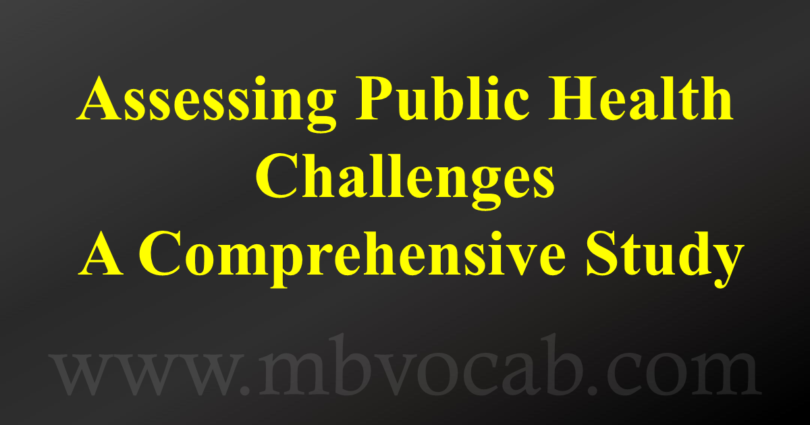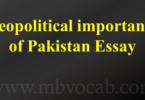Challenges in the Realm of Public Health
In the sphere of public health, Pakistan faces formidable challenges that demand profound consideration. The nation grapples with a soaring mortality rate, a particularly distressing predicament concerning the mortality of women and children. Endeavors undertaken by the government, encompassing initiatives aimed at eradicating afflictions such as malaria and smallpox, as well as comprehensive immunization and polio vaccination campaigns, have been executed. Furthermore, the establishment of Basic Health Units, hospitals, and the inception of new medical colleges has been initiated, alongside provisions for the training of nurses and health visitors. There is also a concerted effort to augment medical education at the post-graduate level within the country and facilitate research abroad for medical professionals.
Nonetheless, the public health sector in Pakistan confronts an array of formidable hurdles, notably:
i. Suboptimal Nutritional Intake
The human body, akin to a complex apparatus, hinges upon the quality of sustenance it receives. Just as a machine operates efficiently with high-quality fuel, the human body functions optimally with a nutritious and well-balanced diet. Regrettably, our nation frequently disregards the importance of a balanced diet. The prevalence of substandard and adulterated foodstuffs in the market exacerbates health issues. The sale of unwholesome meat, for instance, is rampant and has dire consequences for public health.
A stringent regulatory mechanism, enforced by the government, must be in place to ensure the availability of uncontaminated and pure food to the populace. Stringent rules and penalties should be implemented to deter food adulteration.
ii. Contaminated Water Sources
Access to potable water is a rarity in Pakistan, leading to a surge in gastrointestinal and dermatological disorders due to the consumption of tainted water. Insufficient sewerage systems continue to be a prevalent issue in most rural and urban areas. Municipal authorities must prioritize the provision of clean water to the populace, with the installation of water filtration plants in proportion to the local population.
iii. Inadequate Housing Conditions
A significant proportion of the population resides in substandard housing units. In rural areas, proper sanitation practices are often neglected, while urban areas frequently feature cramped and poorly ventilated dwellings with limited rooms. This subpar housing situation contributes to a range of health maladies.
The government ought to devise urban planning policies to address the escalating population density. The establishment of more public parks and recreational spaces in urban areas is imperative to provide citizens with adequate leisure opportunities.
iv. Unsanitary Environments
Piles of refuse mar the landscape of both urban and rural regions, a clear indication of a pervasive disregard for hygiene. Inappropriate waste disposal and mismanagement of sewerage systems proliferate due to a lack of awareness, often stemming from illiteracy. Proper sewerage infrastructure remains deficient in many parts of the nation, fostering the breeding of disease-carrying organisms.
Municipal authorities must be held accountable for rectifying the issue of unsanitary conditions, without financial constraints. Effective planning and construction of sewerage systems in both urban and rural locales are indispensable. Concurrently, consistent measures should be implemented for the regular cleaning of roads, streets, and sewerage lines. A concerted educational effort is also essential, incorporating hygiene principles into the curriculum and utilizing mass media platforms like newspapers and television to disseminate such knowledge.
v. Inadequate Healthcare Facilities and Inferior Pharmaceuticals
Comprehensive medical facilities remain elusive for a significant portion of Pakistan’s populace, particularly in rural areas where hospitals and access to free medications are scarce. While government efforts are ongoing to extend medical services to every corner of the nation, challenges persist. Even in urban centers, patient influx often overwhelms healthcare professionals, compromising the quality of care. Additionally, the utilization of counterfeit or substandard medicines occasionally results in patients contracting new ailments.
The government must urgently prioritize the healthcare sector. This entails the construction of new hospitals and modernizing existing ones, ensuring they are well-equipped. Stringent measures should be enforced against those involved in the production of counterfeit and substandard medications to guarantee the provision of authentic pharmaceuticals to patients.
vi. Environmental Degradation
The rapid expansion of population and industry has ushered in a deluge of toxic materials and gases from factories, vehicular emissions, and deforestation in urban areas, precipitating environmental pollution. This pollution, in turn, is a causative factor for a litany of maladies affecting the heart, lungs, and skin.
To combat air pollution, legislation must compel factories to dispose of their toxic byproducts responsibly, mitigating harm to humans and ecosystems alike. A robust tree-planting initiative can serve as a formidable bulwark against ongoing air pollution. Trees, natural purifiers, adeptly absorb contaminants from the atmosphere, affording a cleaner and healthier environment.







